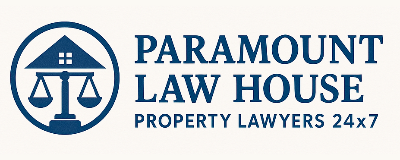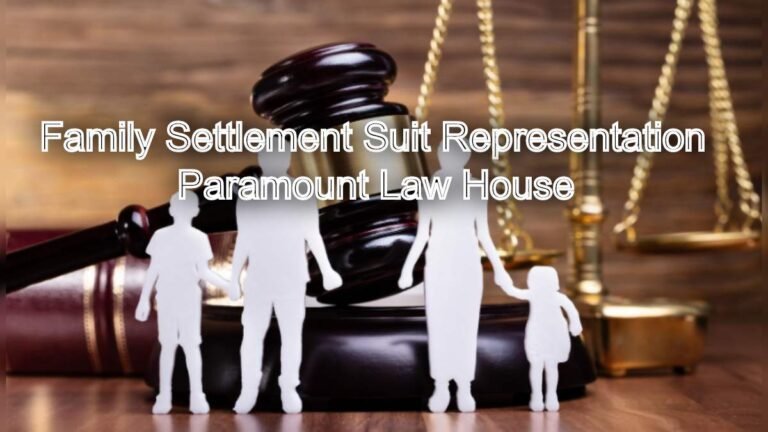Document Legal Verification: Ensure Authenticity and Validity
Documents form the backbone of legal transactions. They record agreements. Establish rights. They prove ownership. However, not all documents are authentic. Some…
Documents form the backbone of legal transactions. They record agreements. Establish rights. They prove ownership. However, not all documents are authentic. Some may contain errors. Others could be forged. Therefore, document legal verification is absolutely crucial. It safeguards your interests. It prevents fraud. Ensures the validity of your transactions. Paramount Law House specializes in property law. We provide comprehensive legal verification services 24×7. Ensure authenticity and validity. We protect your investments.
Document Legal Verification: Ensure Authenticity and Validity: Paramount Law House
The Importance of Legal Verification
Legal verification is a critical due diligence process. It scrutinizes legal documents. Confirms their legitimacy. It ascertains their legal enforceability. This process is particularly vital in property transactions. Large sums of money are often involved. Ownership rights are at stake. Without proper verification, buyers risk significant losses. They could acquire disputed property. They might face legal challenges later.
Furthermore, verification extends beyond property. It applies to wills, contracts, and power of attorneys. It ensures these documents are legally sound. Confirms they reflect the true intentions of the parties. It prevents future disputes. Thus, legal verification acts as a shield. It protects you from financial harm. It secures your legal standing. Paramount Law House prioritizes meticulous verification. We ensure peace of mind for our clients.
What is Document Legal Verification?
Document legal verification is a detailed examination. It checks a document’s authenticity. It confirms its legal validity. This involves several key steps. Firstly, it verifies the genuineness of signatures. It ensures they belong to the stated signatories. Secondly, it confirms the legal capacity of the parties. This means they are competent to enter the transaction. They must be of sound mind. They should be of legal age.
Moreover, it checks for proper stamping and registration. Many legal documents require specific stamp duty. They need registration with the relevant government authority. This makes them legally enforceable. Thirdly, it scrutinizes the content of the document. It ensures accuracy. Checks for inconsistencies. It verifies that all clauses are legally compliant. It searches for hidden conditions. Finally, it confirms the document’s legal history. It looks for previous amendments. It checks for prior disputes. This thorough process leaves no stone unturned. It guarantees the document’s integrity.
Common Documents Requiring Legal Verification in Property Matters
Property transactions involve a myriad of documents. Each requires careful scrutiny. Firstly, the Sale Deed (or Conveyance Deed) is paramount. This document transfers property ownership. It must be authentic. It should be properly registered. Secondly, the Title Deed (or Chain of Title) establishes ownership history. Lawyers trace ownership back decades. They ensure a clear, unbroken chain. This confirms legitimate ownership.
Furthermore, the Encumbrance Certificate (EC) is vital. It reveals any existing liabilities on the property. These include mortgages or liens. A clear EC is essential. Fourthly, the Patta or Chitta (in Tamil Nadu) is a land revenue record. It proves ownership of agricultural land. These must match other ownership documents. Fifthly, the Building Plan Approval ensures legal construction. It confirms compliance with local regulations. Sixthly, the Occupancy Certificate confirms the building is fit for occupation. It shows compliance with building codes. Finally, the Parent Documents (previous sale deeds, gift deeds, etc.) are reviewed. These trace the property’s history. Verifying each of these documents is non-negotiable. It protects against costly disputes.
The Verification Process: A Step-by-Step Approach
The legal verification process follows a systematic approach. Firstly, collection of original documents is key. Photocopies or scanned copies may not suffice. Original documents allow for detailed examination. Secondly, scrutiny of physical attributes takes place. This includes checking the quality of paper. It involves examining watermarks. It looks for signs of tampering.
Moreover, cross-verification with public records is essential. Lawyers compare document details with government records. This includes land records. It covers registration department databases. This step confirms consistency and authenticity. For example, they verify the Document Number and Book Number against the Sub-Registrar’s records. Furthermore, site visits and physical inspection are often conducted. This confirms the property matches the documented description. It identifies any physical encroachments. Finally, legal opinion is provided. This comprehensive report outlines findings. It highlights risks. It advises on proceeding with the transaction. Paramount Law House conducts exhaustive verification. We provide clear, actionable insights.
Red Flags to Look Out For During Verification
Certain indicators should immediately raise suspicion. Recognizing these red flags is crucial. Firstly, any discrepancy in names or spellings across documents. Consistency is paramount. Secondly, unusual delays in providing documents. Legitimate sellers usually provide documents readily. Thirdly, missing links in the chain of title. Every transfer of ownership should be documented. Gaps suggest potential issues.
Furthermore, unclear or ambiguous clauses in the document. Legal language should be precise. Handwritten additions or alterations without proper attestation are suspicious. Documents that appear overly old or new for their purported age can also be a red flag. Unwillingness to provide original documents is a major warning sign. Any pressure to expedite the process without proper verification should be resisted. Heeding these warnings can prevent serious legal and financial repercussions. Paramount Law House is adept at spotting these subtle signs. We protect our clients from fraudulent schemes.
Legal Implications of Unverified Documents
Engaging in transactions with unverified documents carries significant legal implications. Firstly, you risk purchasing a defective title. This means the seller may not have legitimate ownership. You might lose your investment entirely. Secondly, you could face litigation. Previous owners or claimants might challenge your ownership. This leads to costly and prolonged court battles.
Moreover, if the document is found to be forged, it is null and void ab initio. It means it had no legal effect from the beginning. You may have no legal recourse to recover funds. Thirdly, properties with encumbrances could lead to unexpected financial liabilities. You might inherit debts. You might be responsible for outstanding mortgages. Finally, fraudulent transactions can lead to criminal charges. Parties involved could face legal penalties. Therefore, diligent verification is not just advisable. It is a legal necessity. It is the best defense against unforeseen legal complications.
The Role of Property Lawyers in Document Verification
Property lawyers play an indispensable role in document verification. They possess specialized knowledge of property laws. Understand complex legal jargon. They are trained to identify inconsistencies. Firstly, lawyers conduct thorough title searches. They examine public records. They trace ownership history. This ensures a clear title. Secondly, they review all ancillary documents. This includes tax receipts. It covers utility bills. These confirm the seller’s possession and payment history.
Furthermore, lawyers prepare a comprehensive Legal Scrutiny Report. This report details their findings. It highlights any encumbrances. It identifies potential legal risks. They provide expert legal advice. They clarify the implications of each document. Guide clients through the entire transaction process. They draft legally sound agreements. This minimizes future disputes. Paramount Law House offers specialized expertise. We have decades of experience in property law. Provide meticulous document verification. We safeguard your property interests 24×7.
Frequently Asked Questions
A: The primary purpose of document legal verification in property transactions is to ensure the authenticity and validity of all legal documents. It safeguards buyers from fraud, prevents future disputes, and confirms that the property has a clear and legitimate title.
A: Some of the most common property documents requiring verification include the Sale Deed (transfer of ownership), Title Deed (establishing ownership history), Encumbrance Certificate (EC) (revealing liabilities like mortgages), Patta or Chitta (land revenue record), Building Plan Approval (for legal construction), and Occupancy Certificate (confirming fitness for occupation). Reviewing Parent Documents is also crucial to trace the property’s history.
A: Several red flags indicate potential issues during verification. These include inconsistencies in names or spellings across documents, unusual delays in document provision, missing links in the chain of title, unclear or ambiguous clauses, un-attested handwritten alterations, documents appearing disproportionately old or new, and any pressure to rush the verification process. Identifying these can prevent fraudulent transactions.
A: Transacting with unverified documents carries significant legal implications. You risk purchasing a defective title, potentially losing your investment, and facing costly litigation from prior claimants. If a document is forged, it is null and void ab initio, leaving no legal recourse. Additionally, you might inherit unexpected financial liabilities or even face criminal charges in cases of fraud.
A: Property lawyers play an indispensable role due to their specialized knowledge. They conduct thorough title searches, cross-verify details with public records, scrutinize all ancillary documents, and identify inconsistencies or encumbrances. They provide a comprehensive Legal Scrutiny Report, offer expert legal advice on risks, and guide clients through the entire transaction, ensuring the property’s authenticity and safeguarding the client’s interests.
Conclusion
Legal transactions, especially property deals, hinge on the authenticity of documents. Document legal verification is therefore not merely a formality. It is an essential safeguard. It ensures the validity of your investments. Protects you from fraud. It secures your legal rights. From scrutinizing Sale Deeds to identifying red flags, every step is crucial.
Do not proceed with any significant transaction without proper legal verification. Do not leave your investments vulnerable to unauthentic documents. Paramount Law House offers comprehensive legal verification services. We are expert property lawyers. We are available 24×7. Contact us today. Secure your transactions. Ensure peace of mind. Your investment’s authenticity is our commitment.
Read More
- Building Monitoring Services: Protect Your Property Investment
- DTCP Land Approval Services: Ensure Compliance and Approval
- Family Settlement Agreement Drafting: Legal Expertise
- Family Settlement Suit Representation: Experienced Lawyers
- Gift Deed Drafting: Expert Assistance for Property Transfer
- Department of Land Resources (DoLR), Ministry of Rural Development






